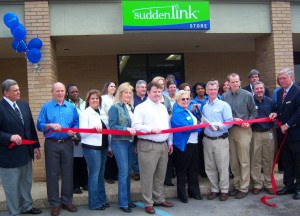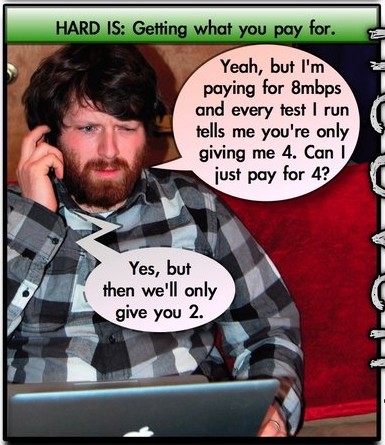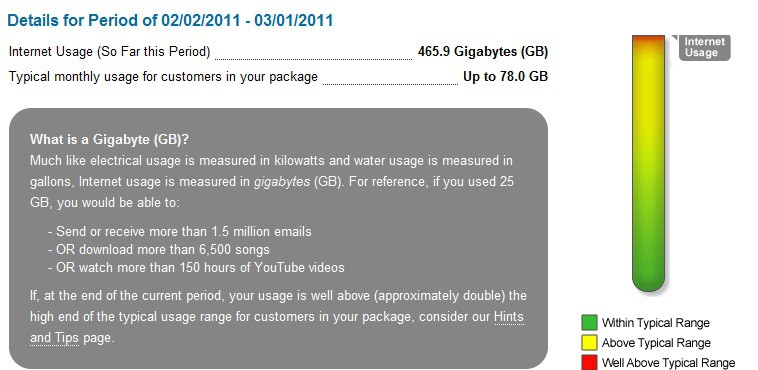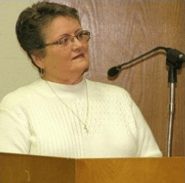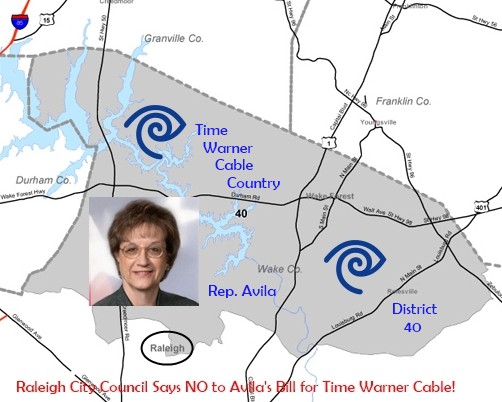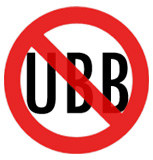Stop the Cap! has obtained the audio from Wednesday’s Public Utilities Committee meeting that quickly pushed through H129, Time Warner’s custom-written, anti-competition and community broadband destruction bill.
Listening to the 44 minute hearing will be disturbing to anyone who supports open government and the concept of voting for or against a complete bill, not one Rep. Marilyn Avila (R-Time Warner Cable) openly admits is going to be changed. For her, that represents no reason to delay the bill — her good friends at Time Warner need this legislation passed today, not tomorrow or next week.
As you listen, we’ve included a voter’s guide with time-indexed comments to help draw your attention to some critical points, and some much-needed fact checking. It will also help you identify the members of the legislature that need to stay, and those that need to go.
Our apologies for the distorted audio at times. When a member leans into the microphone, as some clearly do, it creates significant audio distortion. It gets worse in the last 10 minutes, so watch your volume.
North Carolina’s House Public Utilities Committee Meeting on H129 – Wednesday, March 2, 2011. (44 minutes)
You must remain on this page to hear the clip, or you can download the clip and listen later.
Your Audio Guide to The Committee Meeting
| 2:50 | Apparently Rep. Avila gets her research straight from the cable industry that wants to destroy community broadband. Avila is factually wrong about citizens being on the hook for “high debt” for North Carolina’s fiber networks, all of which are financed by bonds that leave bondholders at risk, not taxpayers. The only interests Avila wants to protect are her good friends at the cable company. |
| 3:30 | Rep. Avila is dreaming if she really believes the providers that have refused to provide service thus far are going to suddenly do so if her bill passes. These communities were ignored before and they will be ignored after. The only difference is that her legislation will guarantee no local community can do anything to fix it. Avila admits openly her bill will stop competition between providers. |
| 6:00 | Rep. Julia Howard is more than willing to hold meetings with those already in the business, but there is no room for actual North Carolina consumers to make their needs known. |
| 8:50 | Rep. Avila pays lip service to the ongoing problem of lack of broadband availability in large areas of the state by saying it’s unfair, but ignores the reality that if communities don’t deliver the service, nobody else will. The red herring of a “public vote” always carries with it loads of fine print. For example, while the industry can spend unlimited amounts on lobbying and advertising campaigns to demagogue networks, local communities are almost always banned from spending one dime to share their views with the public, or respond to the propaganda the industry sends out. In fact, Avila’s bill bans networks from advertising their services or advocating for them. It’s like holding a public debate, but gagging one side so they cannot speak. |
| 12:50 | John Goodman, North Carolina Chamber of Commerce presents the pre-written talking points provided by the cable industry. As you listen, ask yourself whether Mr. Goodman is aware of the details of community broadband, or simply the information handed to him on some sheets of paper from the cable lobby. Then ponder how many times a community provider has forced a private player out of business with so-called unfair pricing and subsidies. |
| 17:30 | Catharine Rice is one of just a handful of speakers that talk about the real-world problems of actual North Carolina citizens. She’s concerned about them, not the bottom line of Time Warner and AT&T. Some examples:
|
| 8:30 | Jack Stanley from Time Warner Cable delivers the day’s ironic moment when he congratulates his cable colleagues and friend from the Chamber for the “eloquence” of their prepared remarks. And why not, when you consider who wrote them. His brief remarks consist mostly of empty promises to find a “fair resolution.” This, from the people who wrote the very unfair bill. |
| 19:30 | The North Carolina League of Municipalities delivers an important fact: Community broadband networks are not created on a whim. They are launched where communities face inadequate or non-existent broadband service. Most of the cities launching their own services tried the public-private partnership route by approaching companies about broadband problems. They were shown the door out. This is why networks like Fibrant and GreenLight exist today. Community broadband disturbs Big Telecom because it represents competition Wall Street and shareholders never expected they would have. Anything that challenges the enormous profits cable and phone companies earn must be eliminated. |
| 21:30 | Mr. Trathen opens his remarks with a distortion, claiming cities are jumping into community broadband because they just want to compete with existing providers. In fact, the record tells a very different story in North Carolina. Cities and communities to this day are trying to get providers from Time Warner Cable, CenturyLink, AT&T, and even Clearwire to deliver service to their citizens and they are being turned down, or delivered DSL service at speeds that will not even qualify as true broadband under the definition established in the National Broadband Plan. That’s a simple fact. How many community networks are competing against Verizon FiOS or other cutting edge broadband networks? The reality is, anemic or non-existent broadband service has been the topic of complaints in local communities across the state for years and years.
Also, Trathen’s desire to “have a conversation” about serving unserved parts of North Carolina reminds me of the saying — talk is cheap. Time Warner has been a part of North Carolina for years and years, and the cable company routinely bypasses any customers who do not live in a dense, populated area to this day. Trathen’s comments that there is nothing in the law today prohibiting public-private partnerships is very true, but as residents have seen, those are far and few between. Trathen is also flat wrong when he claims nothing in the bill prevents a city from moving into an unserved area to provide service. In fact, Avila’s bill prohibits cities from extending service outside of their boundaries. |
| 24:00 | Rep. Paul Luebke wonders why this bill is necessary, because local governments proposing these networks are already answerable to their citizens and to an oversight committee. Leubke correctly points out the legislation is all about letting existing telecom companies decide for the people of North Carolina when/if they will get broadband service, at what speeds, and using what technology. With no new competition on the horizon, H129 effectively delivers all of the state’s broadband interests into the hands of a cable and phone company cartel.
Leubke also expressed concerns that he (and others) are being asked to vote on a bill that has not been finalized yet. Should negotiations between existing providers trying to extinguish community networks and the cities that run them fail to find a solution, the bill’s original language will guarantee financial disaster to existing community broadband services. |
| 29:00 | Rep. Alexander notes that the legislation establishes onerous conditions on community broadband networks that the private sector is completely exempt from. Alexander notes these networks came about because communities were faced with last century broadband — the virtual equivalent of two cans with string between them. This legislation assures those underserved communities will continue to be underserved. |
| 32:00 | Rep. Womble has serious concerns about how this bill is being rammed through the committee. Just minutes before the hearing, Womble was handed a summary of the bill for the first time. Womble is especially upset he is being asked by the bill sponsors to “trust us” when they say they will work out exemptions for existing providers. |
| 37:00 | Rep. Hager goes fishing and catches a number of red herrings about cities expanding their networks outside of their service areas and cross-subsidizing them with pilfered funds from city resources, “unfairly harming” their cable and phone company competitors. He presents no evidence to substantiate this claim. |
| 38:30 | Rep. Hastings falls into the trap of conflating middle-mile fiber backbone projects with delivering broadband to individual homes and businesses as he brings up the Golden Leaf Project, a very worthwhile fiber backbone, but one that will never extend to last mile homes and businesses. Like so many middle-mile projects, this one will deliver service to institutions like schools, libraries and local government. While all very noble, no funds are provided to directly wire service to individual homes that need broadband the most. Private providers would have howled had this been the case. Instead, vague promises like “private providers are interested in leasing capacity” on the network leave consumers with the hope of better days, but they should not hold their breath. Cable operators will not deploy service in rural areas, period, and phone company DSL’s largest impediment remains distance between the central office and individual subscribers. While Golden Leaf may prove beneficial in incrementally moving residential broadband forward, it is not going to provide service to individuals. In fact, H129 will ensure none of these communities can tap into Golden Leaf and directly deliver service to those that continue to be broadband-disadvantaged. |
| 40:00 | Rep. Warren doesn’t like voting on a bill just to find out what it will eventually contain later on. “It gives me chills,” he told the committee. He also dismisses claims the bill is about a “level playing field.” He then directs several pointed questions to Ms. Avila about the financial implications her bill will have on state finances, its bond rating, and other considerations. She dodges all of them with non-answer answers. |
| 43:00 | In less than 30 seconds, the bill is rushed to a committee vote by a motion from Rep. Brubaker, at which point Rep. Steen cuts off discussion (despite the fact more committee members were raising their hands to speak). A voice vote clearly delivers a majority to the NO side, but not in the eyes of the committee chair, who claims the AYES have it, the bill is reported favorably out of the committee, and the meeting is adjourned before anyone has a chance to demand a recorded vote. |
The shocking conclusion of this legislative travesty is the chairman adjourning before a recorded vote can be taken. Without it, constituents can’t identify how their member voted and hold them accountable at the next election.
[Update 3:05pm Monday — Stop the Cap! misidentified Rep. Warren as Rep. Rowan at the 40:00 mark. We have corrected the audio log above and regret the error.]


 Subscribe
Subscribe

